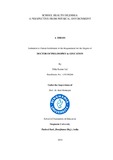Please use this identifier to cite or link to this item:
http://archive.nnl.gov.np:8080/handle/123456789/55| Title: | School health dilemma: a perspective from physical environment |
| Authors: | Lal, Dilip Kumar |
| Keywords: | School health education - Nepal School health Safety and protection Hygiene |
| Issue Date: | 21-Dec-2017 |
| Abstract: | The purpose of this study was to explore the knowledge, attitudes and practices on school health from the perspective of physical environment in order to promote safe school. A cross-sectional descriptive study was designed to assess the knowledge, attitude and existing practices on school health and nutrition of students and teachers. It was felt that the teachers have knowledge about physical environment and school health that is necessary to save children and teachers from the health problems. The problem statement of this study was devised as to identify the status, impacts, problems and corrective measures about the school health and nutrition. Global evidence and research findings have shown that all students are at risk, and vulnerable environment in school, physical facilities are difficult to deliver. By reviewing different literatures, thesis, theories, national and international journals related to Physical Environment of School Health, the researcher made the study more substantive and authentic by incorporating relevant ideas that the researcher gathered through literature review. The researcher followed quantitative as well as qualitative research design with focus on its descriptive cross sectional and phenomenological premise which encompasses ontological, epistemological and methodological assumptions. The ontological framework for this study subscribes to the notion of multiple realities regarding the issue of school health and physical environment. The epistemological assumption dwelt on subjective discourse by research participants. Following the research question, the researcher carried out interview, focus group discussion and field observation with the research participants. By adopting stratified random sampling technique, structured instruments were used to collect the data and analyzed by using descriptive as well as inferential statistical methods. Students were the main actors of this study. The knowledge, attitude and practices were assessed using semi-structured interview and qualitative data were obtained from focus group discussion. The findings revealed that the knowledge varied according to ethnicity, age, and level of education. Students were found with little knowledge on school health and nutrition as compared to teachers in the sample schools. The diversity of ethnicity, level of education, occupation, and religion were found with different levels of knowledge, practice and attitude of the respondents. Most of the students were found with the knowledge about the school health, sanitation and hygiene. Lower is the age higher is the level of knowledge. Teachers with science and health subject teaching were found more knowledge about school health and sanitation. The findings were in line with the national and international trends. The attitude of students was found less positive towards the behavior of health in weak physical environment. Even though existing strategies were promoting school health and nutrition including awareness raising and improving the availability of funds, transport and supply education and health kits, encouraging for institutional capacity building, in reality most of the physical environment were found poor, health facilities were not available in schools. As a result, the students have not been able to use physical facilities for safe schooling. The study has been concluded by feeling the need of knowledge about school health and nutrition not only for teachers, but also students, head teachers and parents, and also other categories of people. Children of today are the teachers of tomorrow. The health and environment education is extremely important to reduce the school health and environment hazards and meet the target of safe schooling and for school health development issues in Nepal. The abstract of the thesis of Dilip Kumar Lal for the Degree of Doctor of Philosophy in Education was presented on June, 2014. |
| Description: | Submitted in partial fulfillment of the requirement for the Degree of Doctor of Philosophy in Education, School of Humanities & Education, Singhania University, India, 2014. |
| URI: | http://103.69.125.248:8080/xmlui/handle/123456789/55 |
| Appears in Collections: | 300 Social sciences |
Files in This Item:
| File | Description | Size | Format | |
|---|---|---|---|---|
| 1. master thesis 2014.pdf | 1.33 MB | Adobe PDF |  View/Open |
Items in DSpace are protected by copyright, with all rights reserved, unless otherwise indicated.